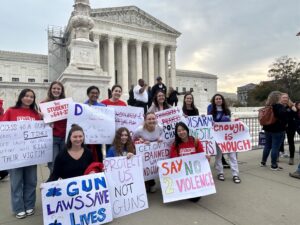This article is part of a series of explainer pieces by the Voice on some of the most important topics on campus. Other articles in the series can be found here.
As the nation’s oldest Catholic university, Georgetown’s approach towards sexual and reproductive health has often been fraught with tension between balancing freedom of speech and adhering to traditional Catholic principles. It often falls on student organizations and activists to not only advocate for changing university policies but to also directly provide students with reproductive health resources unavailable elsewhere on campus.
History
H*yas for Choice (HFC), Georgetown’s most well-known student organization advocating for reproductive rights, was founded by Kelli McTaggart (COL ’92) and Julie McKenna (COL ’92) as GU Choice in 1991. While the organization today is not affiliated with the university and does not qualify for university funding, it was originally recognized as a club with full access to benefits.
The then-Dean of Students John DeGioia granted recognition to the club in accordance with the university’s freedom of speech policies and on the condition that GU Choice did not advocate for or provide information about abortion services. “It is my intention with this decision to balance at Georgetown a commitment to the free exchange of ideas with a 200-year commitment to the moral tradition of the Roman Catholic Church,” DeGioia wrote in an open letter published in 1992.
Then-President Fr. Leo O’Donovan defended the move in a letter to alums. “Disallowing a student group or any public discussion of the issue of abortion on this campus would not be educative. Instead, it would invite accusations that the university does not have the strength of its moral convictions to defend them against those who disagree,” O’Donovan wrote.
The initial decision was met with opposition from religious organizations and alumni as well as students and faculty on campus. A group of alumni, including Patrick Buchanan (COL ‘61) and The Exorcist author William Peter Blatty (CAS ’50), formed the Committee of Georgetown Values and sent letters to thousands of alumni asking for their active opposition to GU Choice. The Georgetown Ignatius Society was created to ask alumni to withhold funding from the university and to resign from positions of leadership in protest. The Archbishop of Washington, Cardinal James Hickey, called the move “most regrettable and… inconsistent with the aims of an institution of higher learning that has a Catholic identity.”
A petition was also brought forth by various students, parents, and alums in October 1991 asking Cardinal Hickey to strip Georgetown of its identification as a Catholic institution. The Catholic Church opposes abortion in all contexts, and the petitioners threatened to directly appeal to the Vatican and Pope John Paul II if Cardinal Hickey refused to remove the Catholic designation.
A student, Bob Lannen (COL ‘92), published an open letter in the Hoya accusing GU Choice of violating its charter by promoting abortion rights events and advocating for pro-choice policies.
In 1992, 14 months after earning university recognition and funding as a student organization, DeGioia reversed his decision and stripped GU Choice of its status due to its failure to follow the terms of the original agreement.
Current Policies
Although the university has liberalized certain aspects of its policy in recent years, Georgetown’s Catholic identity still affects policy on contraception. The university only began including birth control coverage in its healthcare plans in 2012, following the implementation of the Affordable Care Act. Today, coverage is paid for by United Healthcare, the company which underwrites the university healthcare plans.
Furthermore, students cannot be prescribed birth control for contraceptive purposes from the Student Health Center or pick up prescriptions at Georgetown Medstar’s pharmacy. According to official policy, although not guaranteed, the Student Health Center can provide prescriptions for non-contraceptive purposes such as acne or irregular periods.
While over 85 percent of U.S. universities offer free condoms through their respective student health centers, Georgetown prohibits the sale or official distribution of condoms, lubricants, and other items related to sexual health on campus.
Health Education Services, however, does assist in other vital aspects of sexual health. It offers free pregnancy tests, confidential and free services for victims of sexual assault as well as safety planning and assistance in accessing medical care.
H*yas for Choice Today
Today, HFC essentially functions as an unofficial nonprofit organization to meet the needs of students that the university does not provide. Renamed as H*yas for Choice (“hoyas” is a trademark of the athletic department, and can only be used by approved clubs), the organization continued to advocate and expand, in the decades that followed its founding.
Funded by various alums and donors, members are often seen in Red Square or Leavey Center distributing free condoms, lubricant, and sexual health literature, etc to passersby. In 2018, the group launched a program to provide emergency contraceptives, commonly known as Plan B, to all students at no or little cost upon request. The organization also provides an extensive list of resources available in the D.C. area for STI testing, sexual assault, abortion, birth control, and LGBTQ+ students, among other things.
In recent years, there have been calls for the university to once again recognize HFC. Yet, while university recognition would provide full access to benefits including providing a faculty advisor and funding, it also might come at the expense of some of HFC’s most vital programs.
“We’re able to fill a really important gap that exists on this campus, and there is no way that we would be able to do that if we were recognized. We wouldn’t be able to distribute condoms—never mind emergency contraception,” then HFC Vice President Kory Stuer (COL ‘19) said in a 2019 interview with the Voice. “There are so many needs of the community that Georgetown just won’t fill.”
Read More
- HFC 20 years ago
- The 25th anniversary of HFC
- Potential impacts of recognition
- Menstrual product access on campus
- Attempt to ban HFC
- HFC began offering Plan B
This post has been updated to fix a typo in the graphic.






